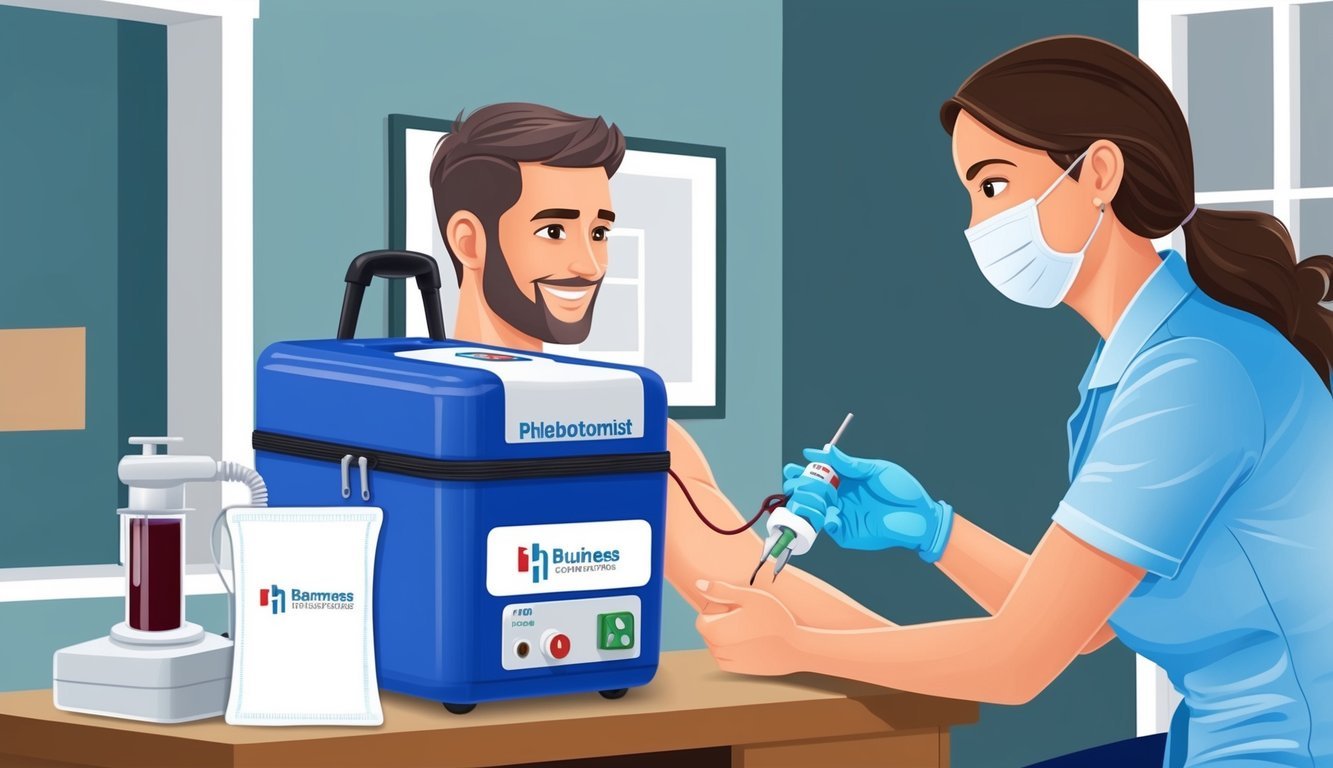Starting a mobile phlebotomy business can be a rewarding venture for those looking to make a difference in healthcare.
The convenience of providing blood draw services at a location of your clients’ choice is a strong selling point in today’s fast-paced world.
Not only does it offer patients comfort, but it also fills a growing demand in the healthcare industry.
As you consider this opportunity, planning becomes essential.
Key factors include obtaining proper training and certification, understanding the costs involved, and finding effective marketing strategies to attract clients.
This blog post will guide you through the necessary steps, so you can start your mobile phlebotomy business on the right foot.
Whether you’re a seasoned phlebotomist or just starting out, there’s plenty to learn about operating successfully in this niche market.
Get ready to explore insights that can help you build a thriving business while providing a valuable service to your community.
Key Takeaways
- Understanding the market is crucial for business success.
- Proper training and certification are essential for credibility.
- Effective marketing can help grow your client base quickly.
Overview of Mobile Phlebotomy
Mobile phlebotomy offers an innovative approach to drawing blood and delivering healthcare services directly to patients.
This method allows for enhanced convenience and accessibility in patient care, playing a vital role in the healthcare industry today.
Defining Mobile Phlebotomy
Mobile phlebotomy refers to the practice of trained professionals who travel to various locations to collect blood samples from patients.
This can occur in homes, workplaces, or community events, making it a flexible option for individuals who may have difficulty visiting a clinic.
Phlebotomists utilize specialized equipment and follow strict protocols to ensure safety and accuracy.
They are often equipped with portable kits that include:
- Blood collection tubes
- Needles and syringes
- Safety gear
- Coolers for sample preservation
The samples collected are then transported to laboratories for testing.
Mobile phlebotomy not only saves time but also helps reduce the stress often associated with medical visits.
Importance in Healthcare Industry
Mobile phlebotomy plays a significant role in improving patient care.
It addresses the needs of patients who require regular blood tests but may face obstacles such as mobility issues or lack of transportation.
This service becomes crucial in various scenarios, including:
- Chronic illness management: Regular monitoring of blood levels is essential for patients with chronic conditions.
- Elderly care: Seniors often benefit from at-home services, improving their healthcare access.
Additionally, mobile phlebotomy supports healthcare providers by accommodating high patient volumes.
By partnering with healthcare facilities, mobile phlebotomists can contribute to better patient outcomes and enhanced service delivery.
Planning Your Mobile Phlebotomy Business

Starting a mobile phlebotomy business requires careful planning and a solid strategy.
You need to outline your goals, understand legal requirements, and acquire the necessary permits and licenses.
Developing a Business Plan
Your business plan outlines your vision and roadmap for the venture.
It should include details about your services, target market, and financial projections.
Key elements to include:
- Executive Summary: Brief overview of your business objectives.
- Market Analysis: Research on demand for mobile phlebotomy services in your area.
- Marketing Strategy: How you will promote your services to attract clients.
- Financial Projections: Expected income, expenses, and profitability over time.
This document will guide your operations and can be crucial when seeking funding.
Refer to templates provided by platforms like Upmetrics for additional structure.
Understanding Legal Requirements
You must comply with various legal requirements to operate successfully.
These include understanding state-specific regulations concerning healthcare providers.
Important aspects to consider:
- Business Structure: Choose your business structure (LLC, sole proprietorship, etc.) based on liability and tax implications.
- HIPAA Compliance: Ensure you are adhering to regulations that protect patient information.
- Insurance: Look into liability insurance to protect yourself and your business from potential lawsuits.
Consult the National Healthcareer Association (NHA) for guidance on best practices and legal compliance to avoid future complications.
Acquiring Necessary Permits and Licenses
Before starting, you need to obtain various permits and licenses.
This is crucial for legal operation.
Key permits and licenses include:
- Business License: Obtain this from your local government to operate legally.
- Employer Identification Number (EIN): Needed for tax purposes if you plan to hire employees.
- Phlebotomy Certification: Consider certifications from organizations like the American Society for Clinical Pathology (ASCP) to enhance your credibility.
Different states have different requirements, so check local regulations thoroughly.
This ensures you meet all regulatory obligations and avoid fines or business closure.
Training and Certification
To start a mobile phlebotomy business, proper training and certification are essential.
You must meet specific qualifications and follow a clear certification process to ensure compliance and professionalism in your practice.
Phlebotomist Qualifications
To become a phlebotomist, you need to have certain qualifications.
Typically, this includes a high school diploma or equivalent.
A formal phlebotomy training program is strongly recommended.
These programs usually cover anatomy, safety procedures, and clinical practice.
You will gain hands-on experience that is vital for learning the skills required.
Here are some common qualifications for mobile phlebotomists:
| Qualification | Description |
|---|---|
| High School Diploma | Required for entry into training programs. |
| Phlebotomy Training | Completion of an accredited program. |
| Clinical Experience | Hands-on practice under supervision. |
Certification Process
Certification for phlebotomists verifies your skills and knowledge.
The process generally includes:
- Choose a Certification Body: Look for organizations like the National Phlebotomy Association or the American Society for Clinical Pathology.
- Complete an Accredited Program: Successful completion of an approved phlebotomy training course.
- Pass the Certification Exam: You must pass a written test and possibly a practical skills assessment.
Meeting these certification requirements can improve your job prospects and credibility as a mobile phlebotomist.
Continuing Education
Continuing education is crucial for keeping your skills up-to-date.
Many states require phlebotomists to complete ongoing training to maintain certification.
This can include workshops, online courses, and seminars.
Here are some options for continuing education:
- Workshops: Hands-on practice and updates on techniques.
- Online Courses: Flexible learning about new regulations and technologies.
- Conferences: Networking opportunities and learning from industry experts.
Staying informed about trends in phlebotomy can help you provide the best service possible.
Operating a Mobile Phlebotomy Business
Running a mobile phlebotomy business requires careful management of your equipment and supplies, strong safety measures, and effective strategies for building a client base.
Each aspect plays a crucial role in delivering quality service while ensuring compliance with healthcare regulations.
Managing Equipment and Supplies
To operate effectively, you need essential equipment and supplies for blood collection.
Your toolkit should include:
| Equipment | Purpose |
|---|---|
| Blood collection tubes | For collecting and storing samples |
| Needles and syringes | For blood draws |
| Alcohol swabs | For disinfecting the skin |
| Personal Protective Equipment (PPE) | To ensure safety for you and clients |
Make sure to regularly check and restock supplies to prevent shortages during appointments.
Proper storage and transportation methods are also vital to maintain the integrity of your materials.
Ensuring Safety and Compliance
Safety is a top priority in mobile phlebotomy.
You must adhere to strict infection control procedures.
This includes proper hand hygiene, using sterile equipment, and following protocols for disposal of biohazard waste.
Liability insurance is essential to protect your business against potential claims.
This coverage should include claims related to injury or infection that may occur during a blood draw.
Additionally, maintain data security to protect clients’ sensitive information.
Follow HIPAA guidelines for handling health data, ensuring that all patient details remain confidential.
Building a Client Base
To grow your mobile phlebotomy business, focus on building relationships with healthcare providers.
Networking with doctors, clinics, and hospitals can lead to ongoing referrals.
Offer flexible appointment scheduling to meet the needs of clients, especially those who may have mobility challenges.
Consider marketing your services through social media, local health fairs, and community events.
Providing exceptional customer service will encourage satisfied clients to recommend you to others.
Package offers or discounts for frequent blood draws can also attract and retain clients.
Marketing and Growth Strategies
To grow your mobile phlebotomy business, you need effective marketing strategies.
Focus on reaching your target market and building strong relationships within your community.
Here are key approaches to consider.
Leveraging Social Media
Social media marketing is essential for connecting with potential clients.
Create accounts on platforms like Facebook, Instagram, and LinkedIn.
Share content that highlights your services, including tips on health and wellness.
Use engaging visuals to grab attention.
Marketing Materials:
- Post educational videos about the importance of regular blood tests.
- Share testimonials from satisfied clients to build trust.
Consider using paid ads targeting local demographics, particularly elderly patients who may benefit from mobile services.
Engaging with your audience promptly is crucial for customer service and branding.
Attending Community Events
Community events are a great way to promote your mobile phlebotomy services in person.
Look for local health fairs, senior expos, or charity events where you can set up a booth.
What to Do:
- Offer free blood pressure checks or informational sessions on health.
- Distribute brochures detailing your services and pricing.
Networking with healthcare professionals at these events can lead to referrals.
Targeting local organizations, like senior centers, can expand your reach to elderly patients.
Fostering Professional Relationships
Building relationships with other healthcare professionals can increase your client base.
Connect with local doctors, clinics, and hospitals to create referral networks.
Regularly communicate your services and how they can benefit their patients.
Strategies to Employ:
- Offer to provide in-office blood draws for busy practices.
- Provide informative newsletters about your services to keep them updated.
Networking can lead to mutually beneficial arrangements, enhancing your credibility in the healthcare community.
By fostering these relationships, you enhance your brand presence and grow your business effectively.
Financial Management and Funding

Effective financial management is crucial for the success of your mobile phlebotomy business.
This includes creating a solid financial plan and exploring various funding options to sustain and grow your operations.
Creating a Financial Plan
A strong financial plan helps you outline your expenses and expected income.
Start by estimating both startup and operational costs.
Key elements to include are:
- Startup Costs: Expenses for equipment, technology, and initial marketing.
- Operating Expenses: Regular costs like payroll, rent, utilities, and supplies.
- Revenue Projections: Forecast your income based on expected patient volume and service pricing.
Using a detailed spreadsheet can help you track these figures effectively.
For more guidance, consider resource templates like the one available here.
A clear financial plan will not only guide your decisions but will also be essential for seeking funding.
Exploring Funding Options
When it comes to funding your mobile phlebotomy business, several options exist.
Here are common sources to consider:
- Personal Savings: Utilizing your own funds can be the simplest option.
- Loans: Look into small business loans from banks or credit unions.
- Investors: Consider bringing on partners who can provide capital in exchange for equity.
- Grants: Research grants specifically aimed at healthcare services.
Make a list of potential funding sources and their requirements to better organize your search.
Websites like Upmetrics can provide insights into what lenders may require.
Understanding these options is vital in securing the right funding for your business needs.
Frequently Asked Questions

Starting a mobile phlebotomy business involves various considerations, from costs to legal requirements and client acquisition.
Here are answers to common questions that can help guide you through the process.
How much does it cost to start a mobile phlebotomy service?
To launch a mobile phlebotomy service, initial startup costs typically range from $25,000 to $45,000.
This includes equipment, supplies, and marketing expenses.
You may also need to account for transportation costs if you plan to travel to clients’ locations.
What are the necessary steps to establish a mobile phlebotomy company?
- Research the market: Understand the demand for mobile phlebotomy services in your area.
- Create a business plan: Outline your goals, target market, and service offerings.
- Register your business: Choose a business name and complete the necessary registrations.
- Purchase equipment: Acquire essential phlebotomy tools and supplies.
What legal requirements must be met to operate a mobile phlebotomy business?
You need to obtain the necessary permits and licenses to operate legally.
Each state has different regulations, so it’s important to research your specific requirements.
Essential certifications might include those for phlebotomy and healthcare services.
How can a mobile phlebotomy business acquire new contracts?
Building relationships with healthcare providers is key.
You can reach out to hospitals, clinics, and doctors’ offices to offer your services.
Networking at industry events can also help you connect with potential clients.
What are effective strategies for client acquisition in mobile phlebotomy?
Effective strategies include:
- Online marketing: Create a website and utilize social media to reach potential clients.
- Referral programs: Encourage existing clients to refer new clients with discounts or incentives.
- Partnerships: Collaborate with medical offices and health facilities to gain access to their patient base.
What are the potential income and profitability in running a mobile phlebotomy business?
Income can vary based on your location and client volume.
Charging between $25 and $50 per blood draw is common.
If you can perform multiple draws in an hour, your earnings can increase significantly, providing a profitable business model.

